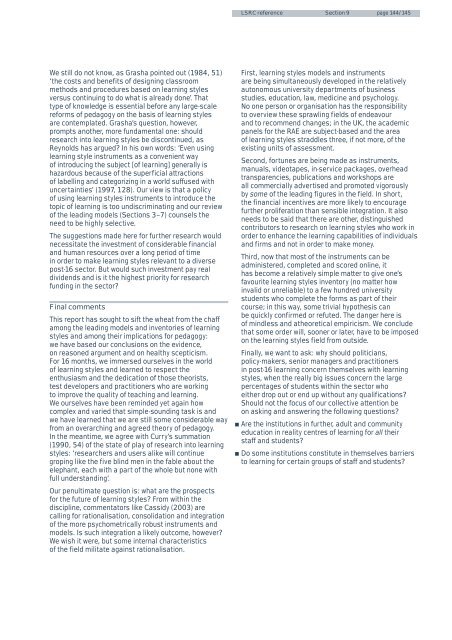learning-styles
learning-styles
learning-styles
You also want an ePaper? Increase the reach of your titles
YUMPU automatically turns print PDFs into web optimized ePapers that Google loves.
LSRC reference Section 9<br />
page 144/145<br />
We still do not know, as Grasha pointed out (1984, 51)<br />
‘the costs and benefits of designing classroom<br />
methods and procedures based on <strong>learning</strong> <strong>styles</strong><br />
versus continuing to do what is already done’. That<br />
type of knowledge is essential before any large-scale<br />
reforms of pedagogy on the basis of <strong>learning</strong> <strong>styles</strong><br />
are contemplated. Grasha’s question, however,<br />
prompts another, more fundamental one: should<br />
research into <strong>learning</strong> <strong>styles</strong> be discontinued, as<br />
Reynolds has argued? In his own words: ‘Even using<br />
<strong>learning</strong> style instruments as a convenient way<br />
of introducing the subject [of <strong>learning</strong>] generally is<br />
hazardous because of the superficial attractions<br />
of labelling and categorizing in a world suffused with<br />
uncertainties’ (1997, 128). Our view is that a policy<br />
of using <strong>learning</strong> <strong>styles</strong> instruments to introduce the<br />
topic of <strong>learning</strong> is too undiscriminating and our review<br />
of the leading models (Sections 3–7) counsels the<br />
need to be highly selective.<br />
The suggestions made here for further research would<br />
necessitate the investment of considerable financial<br />
and human resources over a long period of time<br />
in order to make <strong>learning</strong> <strong>styles</strong> relevant to a diverse<br />
post-16 sector. But would such investment pay real<br />
dividends and is it the highest priority for research<br />
funding in the sector?<br />
Final comments<br />
This report has sought to sift the wheat from the chaff<br />
among the leading models and inventories of <strong>learning</strong><br />
<strong>styles</strong> and among their implications for pedagogy:<br />
we have based our conclusions on the evidence,<br />
on reasoned argument and on healthy scepticism.<br />
For 16 months, we immersed ourselves in the world<br />
of <strong>learning</strong> <strong>styles</strong> and learned to respect the<br />
enthusiasm and the dedication of those theorists,<br />
test developers and practitioners who are working<br />
to improve the quality of teaching and <strong>learning</strong>.<br />
We ourselves have been reminded yet again how<br />
complex and varied that simple-sounding task is and<br />
we have learned that we are still some considerable way<br />
from an overarching and agreed theory of pedagogy.<br />
In the meantime, we agree with Curry’s summation<br />
(1990, 54) of the state of play of research into <strong>learning</strong><br />
<strong>styles</strong>: ‘researchers and users alike will continue<br />
groping like the five blind men in the fable about the<br />
elephant, each with a part of the whole but none with<br />
full understanding’.<br />
Our penultimate question is: what are the prospects<br />
for the future of <strong>learning</strong> <strong>styles</strong>? From within the<br />
discipline, commentators like Cassidy (2003) are<br />
calling for rationalisation, consolidation and integration<br />
of the more psychometrically robust instruments and<br />
models. Is such integration a likely outcome, however?<br />
We wish it were, but some internal characteristics<br />
of the field militate against rationalisation.<br />
First, <strong>learning</strong> <strong>styles</strong> models and instruments<br />
are being simultaneously developed in the relatively<br />
autonomous university departments of business<br />
studies, education, law, medicine and psychology.<br />
No one person or organisation has the responsibility<br />
to overview these sprawling fields of endeavour<br />
and to recommend changes; in the UK, the academic<br />
panels for the RAE are subject-based and the area<br />
of <strong>learning</strong> <strong>styles</strong> straddles three, if not more, of the<br />
existing units of assessment.<br />
Second, fortunes are being made as instruments,<br />
manuals, videotapes, in-service packages, overhead<br />
transparencies, publications and workshops are<br />
all commercially advertised and promoted vigorously<br />
by some of the leading figures in the field. In short,<br />
the financial incentives are more likely to encourage<br />
further proliferation than sensible integration. It also<br />
needs to be said that there are other, distinguished<br />
contributors to research on <strong>learning</strong> <strong>styles</strong> who work in<br />
order to enhance the <strong>learning</strong> capabilities of individuals<br />
and firms and not in order to make money.<br />
Third, now that most of the instruments can be<br />
administered, completed and scored online, it<br />
has become a relatively simple matter to give one’s<br />
favourite <strong>learning</strong> <strong>styles</strong> inventory (no matter how<br />
invalid or unreliable) to a few hundred university<br />
students who complete the forms as part of their<br />
course; in this way, some trivial hypothesis can<br />
be quickly confirmed or refuted. The danger here is<br />
of mindless and atheoretical empiricism. We conclude<br />
that some order will, sooner or later, have to be imposed<br />
on the <strong>learning</strong> <strong>styles</strong> field from outside.<br />
Finally, we want to ask: why should politicians,<br />
policy-makers, senior managers and practitioners<br />
in post-16 <strong>learning</strong> concern themselves with <strong>learning</strong><br />
<strong>styles</strong>, when the really big issues concern the large<br />
percentages of students within the sector who<br />
either drop out or end up without any qualifications?<br />
Should not the focus of our collective attention be<br />
on asking and answering the following questions?<br />
Are the institutions in further, adult and community<br />
education in reality centres of <strong>learning</strong> for all their<br />
staff and students?<br />
Do some institutions constitute in themselves barriers<br />
to <strong>learning</strong> for certain groups of staff and students?


